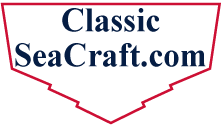
 |
|
|
|
#1
|
|||
|
|||
|
Hey all listen Im not trying to be difficult or stubburn here just want as much info as possible thx for the prior posts. I appreciate it.
The queation waa posed why dont 20s have them???? Again my wheels start, i call some of my marine guys all with different answers. Is it just as simple as obviously SeaCraft made the Inboard model on the 23, could it be that they just kept the hull design for all 23s? So each hull is the same? I'm just throwing it out there, as a long time boater (well I'm only 32yo but been boating my whole life) I completely understand the air vents on an inboard, dangerous situation there, I have seen that explosion as I'm sure a good amount know ir heard of a boat blowing apart bc the blowers weren't put on. But the outboard is set back 3ft (with bracket) so fuel line is out in the open air for sure. As far as the tank and fumes,...I just don't see why it's different from any other boat? Whether Foamed tank or not, idk? Just seems like u would see it more on other boats wouldn't u? I mean a fuel tank under he console is not irregular, the hook up and sender are located there and I assume fuel fumes would be the same issue on every similar hull? No? Again even the 20? Why wouldn't hat be an issue in that model? Are there any cases of SeaCrafts blowing up for this reason? I don't know...... im I asking...?? i cAn do a search. I'm not talking about other model boats, again I have seen that happen. Im Talking SeaCraft 23s and something ill happened from lack of vents. As opposed to some drunk dude who ignited a flare while filling gas lmao!!! Again I'm just curious it's and interesting topic and I want to be sure I want/need to do this before I redo the precious owners fill job. Sully Last edited by Sullivan21; 02-16-2013 at 12:17 AM. |
|
#2
|
|||
|
|||
|
Ok, so the question is; why have bilge vents on an outboard boat?
As Denny (Bushwacker) and Jim (77SceptreOB) mentioned early in the thread, bilge vents allow air to circulate in the bilge to keep moisture levels down. A sealed bilge with even a small amount of water in it is going to create a mini diurnal water cycle. During the day, the hull will heat up and water in the bilge will evaporate. At night, when the hull cools down, the humidity will condense on the inner surface of the hull and the underside of the deck. Polyester based fiberglass is not waterproof. Constant or frequent exposure to liquid water is going to cause it to soak up moisture I can't see that being good for the wood core in the decks and transoms of these boats. In a vented bilge, humid air will be replaced with outside air. The air in the bilge is more likely to be close in temperature to the hull, which should reduce condensation in the bilge. The safety concern over fuel spilled in the bilge has already been discussed. To me it's a lesser issue in an outboard boat. All electrical equipment in your bilge should be labeled "ignition protected" anyway. To me, the reasons for having the vents outweigh the aesthetic considerations. Personally, I like the look. It says "function" in a world where we've sometimes lost track of the reasons we do things. Dave
__________________
Blue Heron Boat Works Reinventing the wheel, one spoke at a time. |
 |
|
|